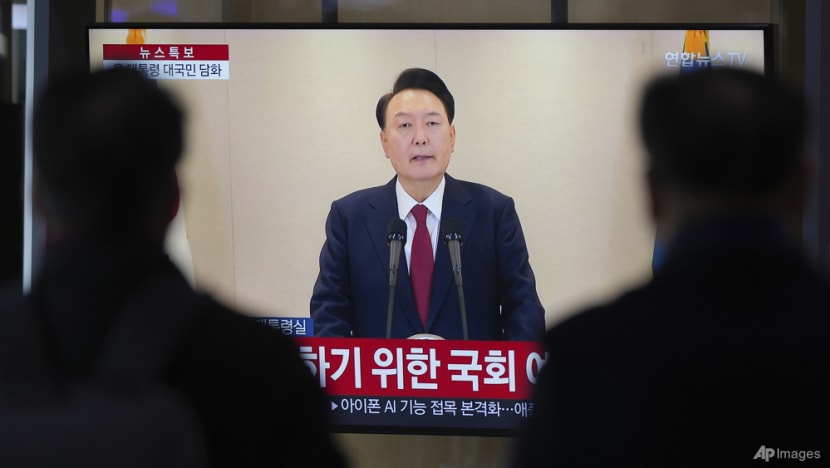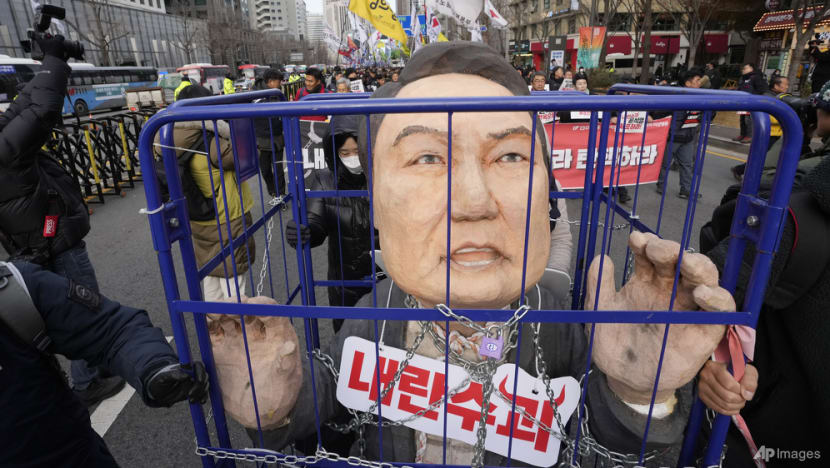Second vote to impeach South Korea’s Yoon ‘much more likely’ to succeed, say analysts
President Yoon Suk Yeol survived the first attempt to impeach him last weekend, after he made a shocking and short-lived declaration of martial law.

People watch a TV screen showing the live broadcast of South Korean President Yoon Suk Yeol's announcement at the Seoul Railway Station in Seoul, South Korea, Thursday, Dec. 12, 2024. (AP Photo//Lee Jin-man)

This audio is generated by an AI tool.
South Korea’s parliament will have a higher chance of impeaching President Yoon Suk Yeol on Saturday (Dec 14), especially after some members of his ruling People Power Party (PPP) publicly voiced support for the motion, said experts.
Yoon survived the first attempt to impeach him about a week ago when most of the party, including PPP leader Han Dong-hoon, boycotted the vote.
But on Thursday, Han reversed course and called for Yoon’s impeachment after the president gave a televised address, vowing to “fight to the end” and defending his actions on Dec 3.
Yoon had plunged the country into a constitutional crisis, sparked protests on the streets, and attracted widespread calls for him to step down following his short-lived declaration of martial law.
He rescinded the move to impose military rule six hours later when parliament voted to reverse it.
“I would say right now, we’re looking at an 80 per cent chance that impeachment succeeds – probably even more than that,” said Mason Richey, associate professor of international politics at the Hankuk University of Foreign Studies.
“But we've already been surprised so many times by the wild swings back and forth in the saga ever since he declared martial law, so I won't say it's more than 80 per cent, because you never know who might end up changing their mind,” he added.

At least 200 votes are needed to impeach Yoon.
Opposition parties have 192 seats in the National Assembly, and they need at least eight PPP members to join them to make up the required two-thirds majority.
As of Thursday, at least seven members of the party were expected to support the new impeachment motion. Richey pointed out that among these seven, at least one has said he thinks more PPP members will follow suit.
WHY THE CHANGE OF MIND?
Analyst Karl Friedhoff said there appears to be no other alternative for Yoon other than impeachment or a quick resignation.
“At this point, I think it’s much more likely than not (that Saturday’s vote will succeed),” said the Marshall M Bouton Fellow for Asia Studies at international affairs think tank Chicago Council on Global Affairs.
He noted that before Yoon’s speech on Thursday, the PPP had proposed a roadmap for his early resignation. He would not be involved in foreign and other affairs before his exit, while party leader Han and Prime Minister Han Duck-soo would be in charge of governance.
However, Yoon then showed defiance on Thursday in not resigning.
“He continues to try to appoint a new defence minister. He’s made some other appointments and accepted some other resignations, and clearly he is in control,” Friedhoff told CNA’s Asia First programme.
“After his speech, it seems that the PPP is now going to turn on him.”
Richey said that most of the party seemed to have preferred what PPP leader Han called an “orderly exit” for Yoon. This meant the president would not really be in control of the presidential office for several months.
“(He) would instead be replaced – also, in my estimation, unconstitutionally and illegally – by a small group of party members and the prime minister,” Richey told CNA938.
Yoon would then resign in the coming months, after which a snap election would be held.
Richey said the PPP initially wanted to avoid being on record as the party who impeached their fellow member.
It also wanted to “try to manipulate the calendar” such that opposition leader Lee Jae-myung will not be able to run for president, he said.
“Ultimately, the PPP does not want to see Lee come to power. They hate him with a burning passion,” added Richey.
Lee was found guilty last month of violating election laws and will be barred from running for office if his conviction is upheld.
But the PPP then realised impeachment was arguably a better way to prevent Lee from running, Richey said. This is because it would keep the situation in limbo - and keep Lee from running - for longer.
“The impeachment process, once it is engaged, is a 180-day window for the Constitutional Court … to reach its decision,” he said.
However, if Yoon resigned in February as the PPP previously said he might, Lee could have two months to possibly run in the snap election, which the party indicated would be held in April or May.
Delaying Yoon’s resignation also allows Lee’s legal issues to run their course, said Richey.
“The expectation is that his convictions will be upheld and that will bar him from running for office,” he added.
Related:
WHAT WILL HAPPEN IF YOON IS IMPEACHED?
If Saturday’s impeachment vote succeeds and the matter heads to the Constitutional Court. Friedhoff said he does not expect a verdict for three or four months.
He also flagged concerns over whether the matter can be heard at all. There are currently six sitting justices, but seven are required to pass judgment.
“If they do opt to remove him and say that his impeachment is constitutional and he is officially removed from power, then we would see an election within 60 days,” Friedhoff added.
“If you’re looking out for when that election might take place, the most likely time is looking like May or June.”
Richey said it remains unclear how the Constitutional Court will reach its seven-judge quorum, and if so, whether they would uphold the impeachment.
The analyst noted that Yoon on Thursday seemed to lay out his likely defence in the Constitutional Court process – essentially, that he is the president and gets to decide what is a national emergency, as well as whether martial law should be imposed.
“He argues that he followed the constitutional process of doing so, and so, with a court that does have conservative justices sitting on it, it's not a guarantee, I think, at this point, that he would in fact be convicted,” cautioned Richey.
“That is ultimately necessary to remove him from office, because without the conviction from the Constitutional Court, he is reinstated as president.”

















